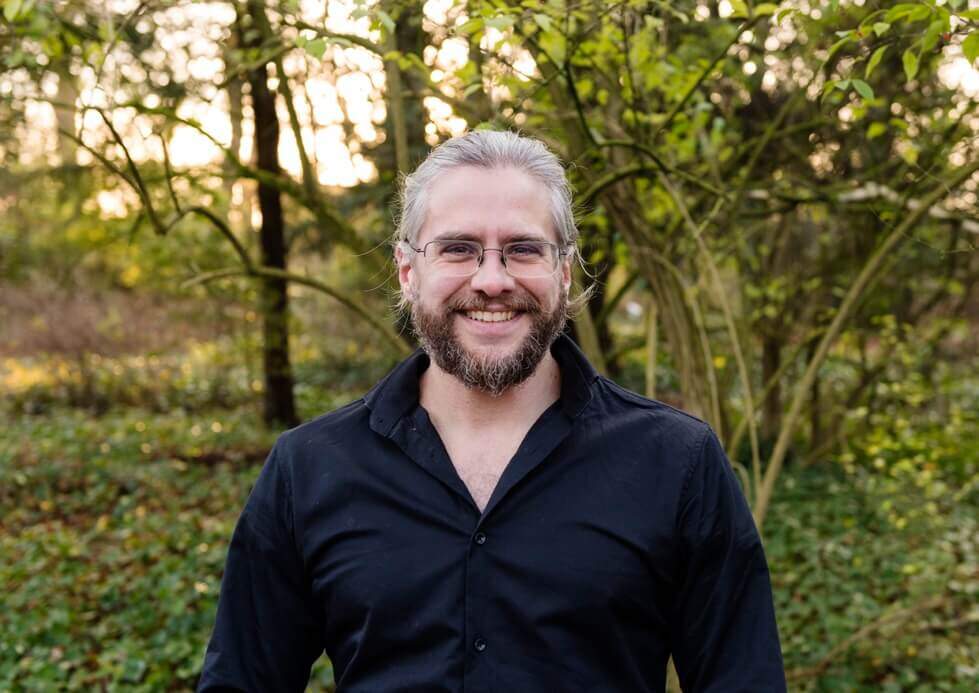
Interview with ACC student Thierry Delatte
Thierry Delatte (45) completed the first and second year training programmes (Coaching and Counselling Year 1 and Year 2) in 2019 and 2020 at the ACC. Thierry was born and raised in Martinique (French Caribbean) and came to live in the Netherlands with his Dutch wife in 2006. His career roots lie in the academic field. He worked at the University of Wageningen for many years, until he decided to make a career switch to coaching/counselling a few years ago. In the meantime, he is a registered coach with the LVSC (National Association for Supervision and Coaching) and has his own coaching practice in Utrecht since more than two years. You can read Thierry’s story below about why he chose to study at the ACC, what the ACC’s training programmes have brought him and what it is like to have your own coaching practice.
You have followed first-year and the second-year training programmes with us. Why did you choose the training programmes of the ACC?
“At the University of Wageningen, I first became acquainted with coaching people in my role as supervisor of Master and PhD students. I noticed that I really enjoyed this role, especially supporting students who were not performing so well. It gave me energy to coach people who have the potential, but still have to take steps in order to realise this potential. At a certain point, I noticed that I actually enjoyed coaching students much more, than working in my role as a scientist. This is why I came up with the idea of immersing myself more in coaching and taking a course in this field. Within the university, there was no training programme available to learn coaching skills. A fellow student then drew my attention to the possibility of following an English training programme at the Academy for Coaching and Counselling.
I heard good stories about the ACC and found out that there are no other institutes in The Netherlands that offer a solid coaching and counselling programme in English. What really appealed to me is that the ACC does not only teach the theory, but actually puts a lot of effort in practising the coaching and counselling skills as well. For that reason I decided to sign up for the first-year training programme at the ACC.”
Why did you decide to follow the second-year programme after completing the first year?
“The programme Coaching and Counselling Year 1 brought me a lot. I learned all the basic skills of coaching and counselling. The programme taught me to listen without judgment and to conduct conversations in a coaching manner. Still, I noticed that at certain moments, for example when practising with test clients, I missed some background knowledge to work with people more profoundly. That is why I followed the second-year programme.
Coaching and Counselling Year 2 ensures that the tools you learn in the first-year programme are sharpened further. This makes it possible to apply methods and techniques more effectively, to better recognise deeper underlying issues and themes, and to deal with disruptions within the coaching process. In the second year, you also work even deeper on your own process. You gain clarity about who you are by looking at your own patterns and blockages. This has made me even more capable of guiding others in their process.
The second-year programme has also taught me who I want to be as a coach and in what field I would like to guide people. This has helped me to position myself as a coach/counsellor and to find a market in which I could specialise myself.”
What did the training programmes bring you personally?
“I have been given the opportunity to take a whole new career path. The training programmes have allowed me to work on myself and to face my own patterns and blockages in life. This has enabled me to coach other people better on their paths, but it has also had a positive effect on my personal life. The courses have made me a better coach, and a better person.
What is also nice to share is that the training programmes have given me a lot of new friends. We have a reunion with the group every year. Because everyone goes into such depth on a personal level, it really brings you closer together. If things are not going well for me, I can still turn to my old fellow students. Arjan van Dijk (teacher of Coaching and Counselling Year 2) also provides a very close group feeling, by creating a safe environment where students can make progress in their professional and personal development.
Finally, the second year has helped me to discover my demographic (target group) and preferred coaching field. I have specialised in supporting life changes among academics. In doing so, I mainly coach/counsel academics who have to deal with stress. How can you, for example, best say ‘no’ and manage your precious time? Where do certain patterns in your behaviour come from and how can you change these patterns in the future? The training programmes have prepared me, in addition to learning all the necessary coaching and counselling techniques, to become a specialised coach/counsellor with a clear focus.”
How do you expect that the training programmes will contribute to becoming a better coach?
“When I started the first-year programme, I thought I knew what coaching was all about. The training programme has however taught me how to properly listen to people without judgment. I have also improved my ability to give feedback. Before I followed the training programmes, I often saw the energy of students that I supervised at the university drain throughout the sessions. After completing your training programme, I noticed that people remained at the same energy level during the conversation, and were much more motivated.
After the first year, I noticed that during the coaching sessions, I was still very preoccupied with which techniques to use. By following the second-year programme, I noticed that I could use methodologies much more naturally, which helped me focussing more on the client rather than the process during the sessions with my coachees.
It is also very valuable that you alternate between the role of coach and coachee during the training programmes. This allows you to experience what it is like to be on both sides of the coaching process. After all, it is important to know what it feels like to be a client. During practice, you also regularly take on the role of observer. This teaches you a lot as well, because you can observe how someone else judges and gives feedback. This gives you new insights into the process between the coach and coachee.
It is also interesting to see that cultural differences can lead to differences in the approach of a coach. I learned to take cultural differences into account when applying certain techniques and to feel where friction can arise. It is very important to know how different people with different cultures can react to certain questions. The fact that the programmes paid attention to this has already helped me within my coaching practice several times.”
Would you recommend the training programmes to other people?
“I certainly would, and I already do. For example, people sometimes approach me on LinkedIn to ask what I think of the programme, whether it would suit them and whether it would make them a better manager.
As far as I’m concerned, the ACC training gives you the broadest basis to get started as a coach/counsellor, because everything you need for this is included: learning the theory, practising in a real-life setting, and working deeply on your own process.
For people who aim to start their own practice, I can definitely recommend the training programmes. After all, I managed to make the career switch from being an academic to practising as an independent coach. For people who want to apply the skills in their current job, I can recommend following the first-year training programme.”
At the moment, you are an assistant teacher in the Dutch first-year training programme. Why did you choose this position and what does it bring you as a coach?
“First of all, I found it very interesting to see how another teacher (Mado Remkes), than the one I followed the programme with, taught the programme. It is also very valuable for me to follow the training programme in Dutch.
As an assistant teacher, you get to see the learning process from a completely different angle, and I now know what it feels like to be a role model for a group. By (partly) teaching myself now, I am also learning to master the coaching and counselling techniques even better. Everything I thought I had mastered in terms of coaching and counselling techniques, I now have even better control of, and I have also learned how to convey that to a group of students. It is great that I can share my experiences gained during the training programmes, and from my coaching practice, with this group.”
What plans do you have for the future within the field of coaching and counselling?
“At the moment, I’m following online training programmes in the field of Transactional Analysis and NLP. In the future, I would like to offer trainings in the area of my own coaching and counselling specialisation myself.
Apart from my interest in expanding my training activities, I am planning to follow a Master’s programme in Psychology. I don’t necessarily do this with the goal of becoming a therapist, but more so to learn more about Transpersonal Psychology (Spiritual Psychology). I became more interested in this topic after we discussed it during the second-year programme at the ACC. Eventually I would like to obtain a PhD in this subject. I can also apply the knowledge gained from this Master’s programme in my coaching practice.”
What is it like to have your own practice?
“What I really like is the freedom I have now. I can plan my own time and can schedule coaching sessions when it suits me. Since my family life is very important to me, this freedom is a huge advantage.”
How do clients find you?
“Because I still gave trainings at a few universities after starting my coaching practice, I had a lot of contact with students who happened to be in need of coaching. Many of these students became my coaching clients. Subsequently, the students whom I coached recommended me to other students, which resulted in a steady stream of clients. As a result, my coaching practice has grown considerably.
I don’t do a lot of paid advertising myself, word-of-mouth advertising has proven to be the most effective way to attract new clients. Of course, I do have a website, which mainly functions as a business card. People want to know who you are, what your background is and what the costs for a coaching session or trajectory are.
During the second-year programme, one of the topics is starting your own practice. In this block, themes like business skills, entrepreneurship, reporting, administration, marketing and how to deal with the GDPR are covered. This knowledge is very useful for setting up your own business.”
More information about the programme Coaching and Counselling Year 1
More information about the programme Coaching and Counselling Year 2
Editor’s note: Thierry Delatte has since become a teacher at the ACC.

